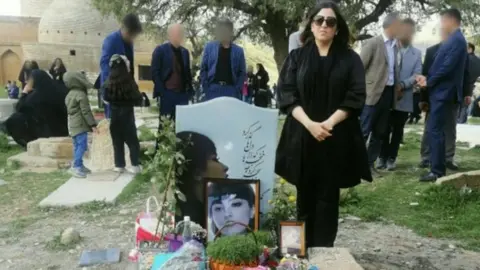Iran stops families marking anniversaries of protesters' deaths
 BBC
BBCThe families of people killed at last year's protests in Iran say authorities have stopped them holding memorials on the anniversaries of their deaths.
Nasrin Shakarami, whose 16-year-old daughter Nika became a symbol of the nationwide unrest, said she was forced to call off a vigil on Thursday.
"I do not want participants to get hurt," she wrote on Instagram.
Nika's sister, Aida, said officials had warned her mother that she would be arrested if she went to the grave.
Hundreds of people have been killed in a violent crackdown by security forces since protests erupted last year. They were in response to the death in custody of Mahsa Amini, a 22-year-old woman who was detained by morality police for allegedly wearing her hijab "improperly".
Four days after Mahsa died, Nika was filmed at a protest in Tehran setting fire to her headscarf, while other protesters chanted "death to the dictator" - a reference to the Supreme Leader Ayatollah Ali Khamenei.
Nika disappeared that evening after telling a friend that she was being chased by police. Her family eventually found her body at a mortuary 10 days later.
They have alleged that she died from blows to the head and rejected claims from officials that she had killed herself.
 BBC Persian source
BBC Persian sourceAuthorities also deterred Mahsa Amini's family from holding a vigil at her grave in the western city of Saqqez last Saturday, in an apparent attempt to prevent fresh protests.
Revolutionary Guards reportedly detained her father, Amjad, and warned him against marking the anniversary before releasing him.
The husband of Minoo Majidi - a 62-year-old woman who was shot by security forces in the western city of Kermanshah - was also summoned to sign a written pledge not to hold an anniversary event this week, according to his daughter.
"They told my father that he could not mark her death, neither at the cemetery nor at home," Mahsa Piraei, who lives in the UK, told the BBC.
He still held a vigil at home on Wednesday but intelligence agents were present, she added.
Security forces meanwhile attacked the family of Javad Heydari on Thursday - a day before the anniversary of the 39-year-old's death at a protest in the northern city of Qazvin.
Videos posted online appeared to show a group of riot police firing tear gas at the family's home and beating several people in the street outside.
Allow X content?
Javad Heydari's sister Fatemeh, who has left Iran, said their brother Ruhollah was detained and that several of their relatives were wounded in the incident.
"They have taken my brother as a hostage," she said. "All the roads to our village are blocked and our house is under siege."
Fatemeh has accused security forces of arbitrarily arresting, intimidating and harassing members of her family on multiple occasions since her brother's funeral, when footage of her defiantly cutting her hair over his coffin went viral.
On 3 September, the outspoken mother of Erfan Rezaei - a 21-year-old man who was shot dead during protests in the northern city of Amol - was arrested, according to activist collective 1500 Tasvir. Farzaneh Barzekar's Instagram account has been deactivated since then.
Although authorities in Iran have repeatedly used deadly force against protesters in recent years, preventing families from grieving is an unprecedented step for them.
"Here, atrocities are justified. But protesting against oppression incurs the most dire consequences, such as disappearance, prison and death," Nasrin Shakarami wrote.